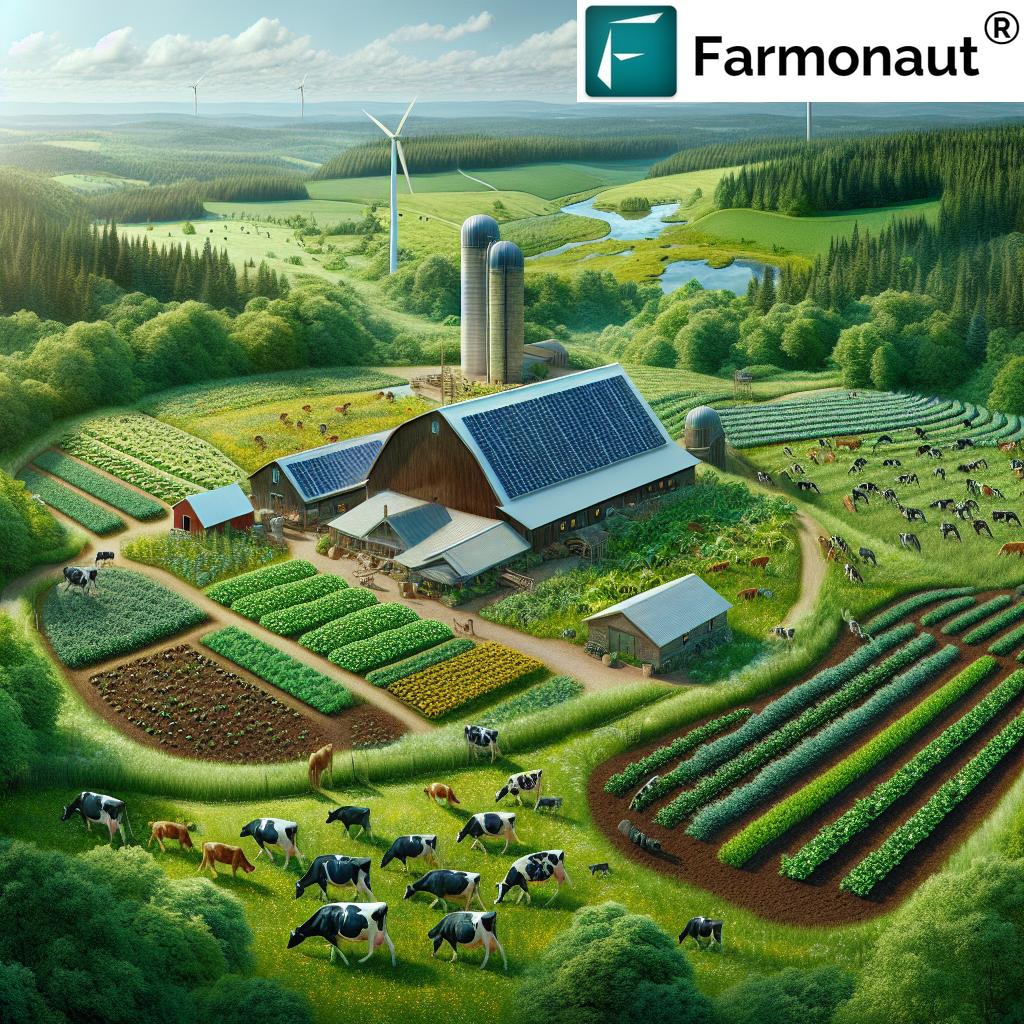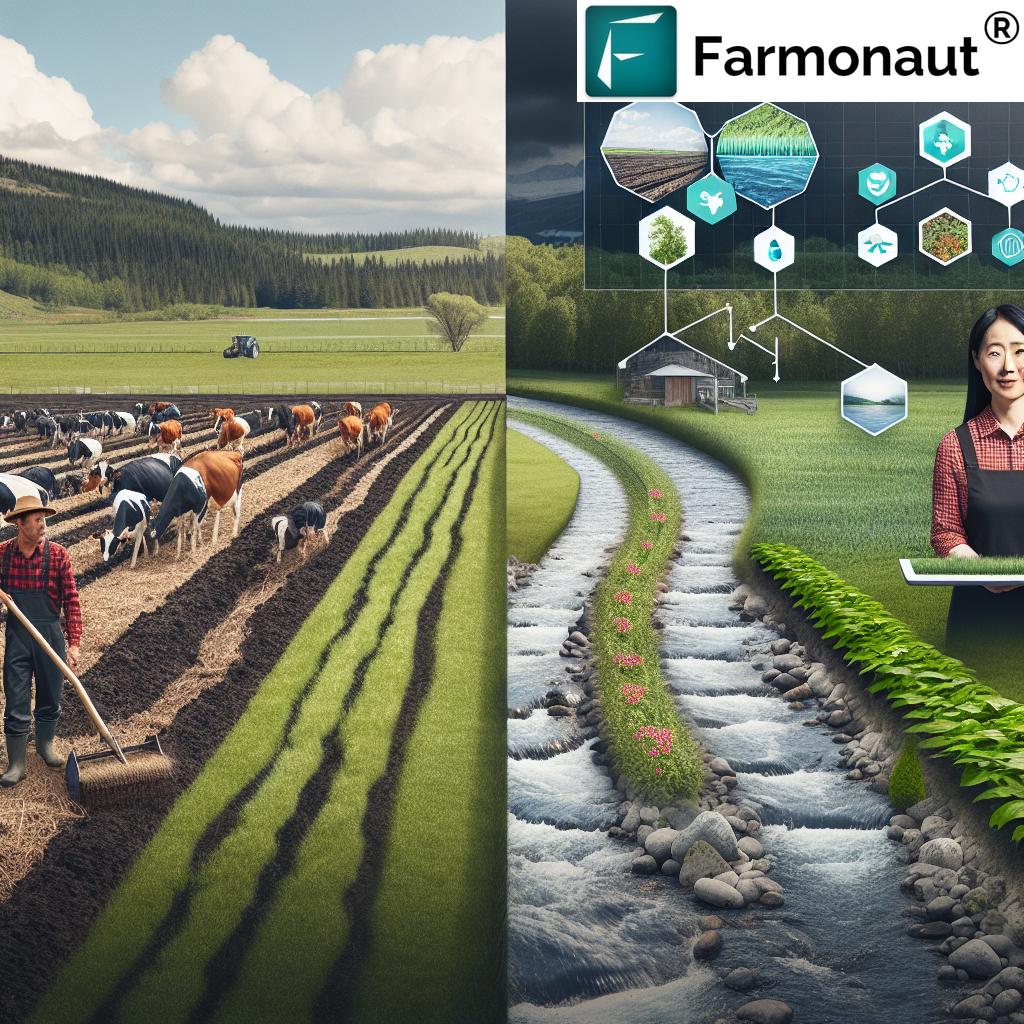Sustainable Canadian Dairy: How Farmers Are Innovating for Net-Zero Emissions and Soil Health

“Canadian dairy farmers implementing proAction certification achieve 35% higher standards in food safety and animal care.”
In the heart of Canada’s vast agricultural landscape, a revolution is quietly taking place. Canadian dairy farmers are at the forefront of sustainable agriculture, pioneering innovative techniques that are reshaping the industry. As we delve into the world of sustainable dairy farming and regenerative agriculture techniques, we’ll explore how these practices are not just transforming the Canadian dairy industry but also paving the way for a more sustainable future in agriculture globally.
The Journey Towards Net-Zero Emissions in Agriculture
The Canadian dairy industry has set ambitious goals to achieve net-zero emissions, recognizing the urgent need to address climate change. This commitment is driving innovation across the sector, from small family farms to large-scale operations. Let’s explore some of the key strategies being implemented:
- Precision Feeding: By optimizing animal nutrition, farmers reduce methane emissions from cattle while improving milk production efficiency.
- Renewable Energy Adoption: Many farms are installing solar panels and biodigesters to generate clean energy and reduce reliance on fossil fuels.
- Carbon Sequestration: Implementing practices that enhance soil carbon storage, such as minimal tillage and cover cropping.
These efforts are supported by cutting-edge technologies, including those offered by Farmonaut. Our satellite-based farm management solutions provide valuable insights for precision agriculture, helping farmers optimize resource use and reduce their environmental footprint.
Innovative Farming Practices for Soil Health Improvement
Soil health is a cornerstone of sustainable agriculture, and Canadian dairy farmers are implementing a range of practices to enhance soil quality:
- Minimal Tillage: Reducing soil disturbance to preserve soil structure and beneficial microorganisms.
- Cover Cropping: Planting crops between main growing seasons to prevent erosion and add organic matter to the soil.
- Crop Rotation: Diversifying crop sequences to improve soil fertility and break pest cycles.
These practices not only improve soil health but also contribute to carbon sequestration, playing a crucial role in mitigating climate change.
Water Conservation in Dairy Farming
“The Canadian dairy industry’s sustainable practices have reduced water usage by 20% in the last decade through innovative conservation methods.”
Water is a precious resource, and Canadian dairy farmers are leading the way in conservation efforts. Some key strategies include:
- Efficient Irrigation Systems: Implementing precision irrigation techniques to reduce water waste.
- Water Recycling: Reusing water from milk cooling systems for cleaning and other farm operations.
- Rainwater Harvesting: Collecting and storing rainwater for use during dry periods.
Farmonaut’s satellite-based monitoring can help farmers track soil moisture levels, enabling more precise irrigation scheduling and further water conservation.
Explore Farmonaut’s API for advanced agricultural insights
The proAction Certification Program: Ensuring High Standards
The proAction certification program is a cornerstone of the Canadian dairy industry’s commitment to excellence. This comprehensive program ensures high standards in several key areas:
- Food Safety: Implementing rigorous protocols to ensure the safety and quality of dairy products.
- Animal Care: Adhering to strict guidelines for animal welfare and health.
- Traceability: Maintaining detailed records to track animals throughout the supply chain.
- Biosecurity: Implementing measures to prevent the introduction and spread of diseases.
- Environmental Sustainability: Adopting practices that reduce environmental impact and promote sustainability.
This certification not only ensures the highest standards in dairy production but also builds consumer trust in Canadian dairy products.

Dairy Nutrition Education: Empowering Consumers
Education plays a crucial role in promoting sustainable dairy consumption. Canadian dairy organizations are actively engaged in providing resources on dairy nutrition, including:
- Nutritional benefits of dairy products
- Sustainable consumption practices
- Understanding dairy labels and certifications
These educational initiatives help consumers make informed choices that support both their health and sustainable farming practices.
Agricultural Biodiversity: A Key to Sustainability
Biodiversity is essential for resilient and sustainable agricultural systems. Canadian dairy farmers are increasingly recognizing its importance and implementing practices to promote biodiversity on their farms:
- Diverse Crop Rotations: Growing a variety of crops to improve soil health and support diverse ecosystems.
- Hedgerows and Buffer Strips: Creating habitat for beneficial insects and wildlife.
- Native Plant Species: Incorporating native plants into pastures and field margins to support local ecosystems.
These practices not only enhance biodiversity but also contribute to natural pest control and pollination services, reducing the need for chemical inputs.
Rotational Grazing: Enhancing Pasture Health
Rotational grazing is a sustainable practice gaining traction among Canadian dairy farmers. This method involves moving cattle between different pasture sections, allowing each area time to recover and regrow. Benefits include:
- Improved pasture productivity and quality
- Enhanced soil health and carbon sequestration
- Reduced soil erosion and improved water retention
- Increased biodiversity in pasture ecosystems
Farmonaut’s satellite imagery can assist farmers in monitoring pasture health and optimizing grazing rotations, further enhancing the benefits of this practice.
Research Driving Industry Innovation
The Canadian dairy industry is committed to ongoing research and development to drive innovation in sustainable practices. Key areas of focus include:
- Methane Reduction: Exploring feed additives and breeding strategies to reduce enteric methane emissions from cattle.
- Precision Agriculture: Developing advanced technologies for more efficient resource use and farm management.
- Circular Economy: Investigating ways to upcycle dairy by-products and reduce waste.
This research is crucial in keeping the Canadian dairy industry at the forefront of sustainable agriculture globally.
The Role of Technology in Sustainable Dairy Farming
Technology plays a pivotal role in advancing sustainable practices in the dairy industry. Farmonaut’s satellite-based farm management solutions offer several benefits:
- Precision Agriculture: Our satellite imagery provides detailed insights into crop health, allowing for targeted interventions and optimized resource use.
- Water Management: Soil moisture monitoring helps farmers make informed irrigation decisions, conserving water resources.
- Carbon Footprint Tracking: Our tools can help farmers monitor and reduce their carbon emissions, supporting the industry’s net-zero goals.
By leveraging these technologies, Canadian dairy farmers can enhance their sustainability efforts while improving productivity and efficiency.
Explore Farmonaut’s API Developer Docs for integration options
Sustainable Practices in Canadian Dairy Farming
| Sustainable Practice | Environmental Benefit | Implementation Rate (Estimated) | Farmonaut Technology Support |
|---|---|---|---|
| Minimal Tillage | Reduces soil erosion, improves soil structure | 65% | Satellite monitoring of soil health |
| Rotational Grazing | Enhances pasture productivity, increases carbon sequestration | 55% | Pasture health monitoring, grazing optimization |
| Cover Cropping | Prevents soil erosion, improves soil organic matter | 70% | Crop health monitoring, growth stage analysis |
| Manure Management | Reduces greenhouse gas emissions, improves nutrient cycling | 80% | Field nutrient mapping, application optimization |
| Precision Feeding | Reduces methane emissions, improves feed efficiency | 75% | Integration with farm management systems |
| Renewable Energy Use | Reduces carbon footprint, promotes energy independence | 40% | Carbon footprint tracking |
The Future of Sustainable Dairy Farming in Canada
As we look to the future, the Canadian dairy industry is well-positioned to continue leading in sustainable agriculture. Key areas of focus for the coming years include:
- Further Emissions Reductions: Continued efforts to reduce greenhouse gas emissions through innovative technologies and practices.
- Enhancing Biodiversity: Expanding efforts to promote on-farm biodiversity and ecosystem services.
- Circular Economy Integration: Developing new ways to reduce waste and create value from by-products.
- Consumer Education: Increasing transparency and educating consumers about sustainable dairy production.
With the support of advanced technologies like those offered by Farmonaut, Canadian dairy farmers are well-equipped to meet these challenges and continue their journey towards a more sustainable and resilient industry.
Conclusion: A Sustainable Future for Canadian Dairy
The Canadian dairy industry’s commitment to sustainability is transforming the sector, setting new standards for environmental stewardship, animal welfare, and food safety. From innovative farming practices to cutting-edge research, Canadian dairy farmers are leading the way in creating a more sustainable and resilient food system.
As consumers, we play a crucial role in supporting these efforts by choosing sustainably produced dairy products and staying informed about the industry’s practices. By working together – farmers, consumers, and technology providers like Farmonaut – we can ensure a sustainable future for Canadian dairy and contribute to global efforts in sustainable agriculture.
FAQ Section
Q: What is net-zero emissions in agriculture?
A: Net-zero emissions in agriculture refers to the goal of balancing the greenhouse gases emitted by agricultural activities with an equivalent amount removed from the atmosphere, resulting in no net increase in atmospheric greenhouse gases.
Q: How are Canadian dairy farmers improving soil health?
A: Canadian dairy farmers are improving soil health through practices such as minimal tillage, cover cropping, crop rotation, and implementing regenerative agriculture techniques that enhance soil organic matter and biodiversity.
Q: What is the proAction certification program?
A: The proAction certification program is a comprehensive initiative by the Canadian dairy industry that ensures high standards in food safety, animal care, traceability, biosecurity, and environmental sustainability on dairy farms.
Q: How does rotational grazing benefit the environment?
A: Rotational grazing benefits the environment by improving pasture productivity, enhancing soil health, increasing carbon sequestration, reducing soil erosion, and promoting biodiversity in pasture ecosystems.
Q: What role does technology play in sustainable dairy farming?
A: Technology, such as Farmonaut’s satellite-based farm management solutions, plays a crucial role in sustainable dairy farming by enabling precision agriculture, optimizing resource use, monitoring crop and soil health, and helping farmers make data-driven decisions to reduce their environmental impact.






